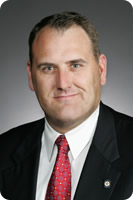Debating party purity and discretionary wisdom

By Patrick B. McGuigan | Oklahoma Watchdog
OKLAHOMA CITY — The late Paul M. Weyrich, a man keenly interested in seeing conservatives govern after generations in the policy wilderness, once told me a funny story from the “Old Right” days of the 1960s.
SPARKS FLYING: Oklahoma Democratic state Sen. John Sparks of Norman pressed for relatively low taxes on the state’s oil and gas industry. That cost him the minority leadership position in the state Senate.
Two hard-core conservatives are having their customary Friday evening drinks at a D.C. watering hole, Weyrich began. They decried the latest failure of fellow conservatives in Congress to stop this or that advance of Lyndon Johnson’s “Great Society,” certain to bring ruin to the nation.
After cataloguing the sins of every voting leader in both the House and Senate, the older of the two gentlemen said to his somewhat younger colleague: “You know, there are only two true conservatives left in Washington, and that’s me and you. And, I’m not so sure about you.”
This tendency is apparent approaching the June 24 Republican primary for the U.S. Senate seat that Tom Coburn will vacate at year’s end. When U.S. Rep. James Lankford, R-Oklahoma City, is tagged a Republican in name only, a “RINO,” the term has lost meaning.
Many conservatives believe former Oklahoma House Speaker T.W. Shannon, R-Lawton, is the best choice. Randy Brogdon, the former state Senator in the U.S. Senate race, who ran impressively against Mary Fallin in the 2010 gubernatorial campaign, will probably finish third.
Each of these fellows votes the “right” way 90 percent of the time or more. Primary voters are grappling with shades of difference – deciding who among them will best advance the cause of limited government and personal liberty.
I am reminded of this emphasis on differences rather than similarities recalling the collapse of support for state Sen. John Sparks, of Norman, a Democrat I respect.
Sparks was on track to become the Democratic leader in the state Senate, proudly declaring in February, “The Democratic Caucus provides contrast where it is needed; we ask the hard questions; we shine light on the dark spaces; and we hold the Republicans accountable.”
Sen. Sean Burrage, D-Claremore, his long-time friend and the man he would be replacing, called Sparks “a loyal, hard-working and effective lawmaker.”
Then, in March, came rising tensions around the important debate over energy policy and taxation of drilling in the “oil and gas bid-ness,” to use the Okie vernacular.
Once upon a time, the tax on oil and natural gas wells was 7 percent at the well-head. Then came the Great Recession. The Legislature, working with Democratic Gov. Brad Henry, dropped the rate to 1 percent, an incentive for the fast developing but still experimental horizontal drilling technology.
Now, some wanted to return to the 7 percent rate. Some were willing to go as high as 5.3 percent, others 2 percent and still others want to do nothing. The Oklahoma Council of Public Affairs favored the lower rates. The Oklahoma Policy Institute pressed for higher rates.
Those calling for the higher rate argued the incentive “cost” the state $161 million in lost tax revenue last year and would lose $251 million this year.
Independent producers contended the industry was already paying more than $800 million in gross production taxes every year, 25 percent of all the taxes paid in Oklahoma.
Sparks, the loyal, hard-working, effective Democrat, laid out a position closer to the oil industry than to consumers and taxpayers.
“It’s bewildering,” he said in a newspaper essay, “that some of Oklahoma’s most high-profile elected officials are trying to raise taxes on oil and gas under the pretense that the industry needs to pay its fair share.”
Senate Democrats threw Sparks overboard, apparently upset he had made himself a player in energy tax negotiations. They replaced him with state Sen. Randy Bass of Lawton who was willing to let “those discussions unfold before staking out a definitive position.”
“We needed to go in a different direction to move the caucus forward,” Bass said.
In the end, the Legislature in the final hours of the 2014 session raised the tax to 2 percent and will slide it upward and back to its former 7 percent.
Let’s be honest. Democrats jettisoned from party leadership a guy whose advocacy of the energy business put him squarely in the tradition of former U.S. Sen. Robert S. Kerr, former U.S. House Speaker Carl Albert, and former Gov. Brad Henry, all Democrats.
This is an odd way to advance the interests of a party with 12 members in a Senate of 48.
This is adapted from an essay forthcoming in the June edition of Perspective Magazine, monthly publication of the Oklahoma Council of Public Affairs (OCPA). You may contact Pat at pmcguigan@watchdog.org.







